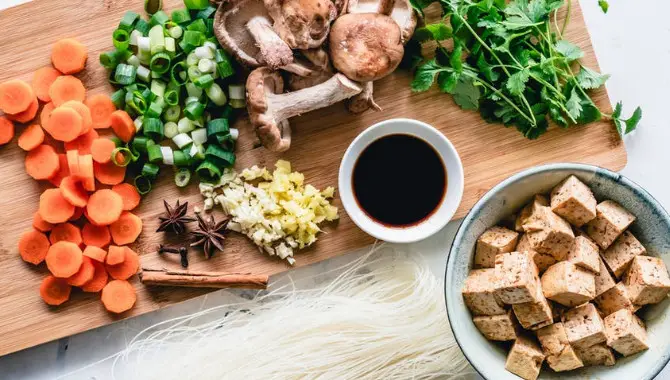When switching to a vegan diet, one of the first things many people seek out is a reliable ingredient that can be used to replace meat in everyday dishes. Chances are, if you search online for examples of such ingredients, tofu will be recommended and it has become a staple of vegetarian cookbooks around the world. Of course, it is important to understand that not all vegetarian meat replacement products are appropriate for a vegan diet, and tofu is an ingredient that causes a lot of confusion because many people are unsure of where it actually comes from.
So is tofu vegan? The good news is that tofu is perfectly vegan-friendly and is also one of the single best sources of dietary protein for vegans as well. It is made through a coagulation process involving soy milk, which is derived from soybeans, meaning it contains no animal products.
With that being said, there are some variations of tofu, which may be sold in shops or in restaurants, where additional ingredients are used and in these cases, vegans will need to take care to avoid any that have added animal ingredients. Although these varieties are not especially common, they do exist and are a potential pitfall. In this article, I will explain what tofu is in more detail and why it is safe for vegans to eat. I will also explain some of the exceptions and cover some of the main health-related questions people have about tofu.
Is Tofu Safe for Vegans to Eat?
The first and most important question for vegans is whether or not tofu is safe to consume and the good news here is that it is; at least in its pure form. Some vegans are initially skeptical of tofu, partly because it resembles various dairy products and partly because it is also known as bean curd, with the word “curd” often linked to dairy too.
Tofu is produced by coagulating soy milk, in a process that is not dissimilar to cheese production, albeit without the use of animal products. In simple terms, this process involves preparing soy milk, which is made by soaking and grinding soybeans. The milk is then coagulated, resulting in soybean curds forming and the curds are then pressed into solid blocks of tofu. Soy milk is completely dairy-free and there are no other ingredients that should concern vegans.
Read Also: Can vegans eat shrimp?
Although the full history of tofu is somewhat unclear, it is known that tofu was eaten as far back as 2,000 years ago in China, and it subsequently spread to other parts of Asia in the years that followed. Today, it is popular across the globe, especially among vegetarians and vegans, and it is often marketed or spoken about as a meat substitute.
Despite its popularity, tofu is notable for its relative lack of taste and smell. However, this makes it extremely versatile, as it can be made to easily take on the taste of the food it is served with, while also providing a unique texture and greater substance. Blocks of tofu can vary quite significantly in terms of how soft or hard they are, and tofu can be eaten hot or cold, cooked or uncooked, with frying, baking and other cooking options all available.
Tofu is considered an excellent source of both iron and protein and is naturally low in calories too. Depending on where you buy it from, and in what form, tofu may also be fortified with calcium and/or Vitamin B12. When you were initially making your mind up on why to become vegan, it is likely that you encountered references to veganism potentially leading to Vitamin B12 deficiencies. With this in mind, it is worth noting that not only is tofu safe for vegans to eat, but it can also potentially play a crucial role in providing the necessary vitamins, minerals, and nutrients needed to stay healthy.
Generally, when it comes to tofu, the main thing vegans need to be concerned about is whether the food it is being served with is vegan-friendly. Nonetheless, there are some forms of processed tofu, which are either designed to enhance its flavor or alter its qualities, and this processing can mean the addition of other ingredients. As I will explain in the next section, it is not unheard of for animal products to be used for this purpose, which makes it important for vegans to take sensible precautions when buying unique varieties or tofu, or certain tofu dishes served in restaurants.
Are There Non-Vegan Varieties of Tofu?
While tofu itself is perfectly suitable for a vegan diet, certain flavored or processed varieties may not be. Adaptations may be made for a number of reasons, including altering the taste of the tofu or enhancing its shelf-life. If you are buying a non-standard tofu product, where the tofu has been altered in such a way, you need to take care to double-check that no animal products are included in the ingredients list.
One of the best-known examples of a tofu variant that may not be vegan-friendly is widely referred to as ‘stinky tofu’. This dish is a kind of fermented tofu, which is popular in China, Hong Kong and Taiwan. Its name is a reference to its strong, pungent smell, which is sometimes compared to the smell of sewage. The reason it may be unsuitable for vegans is that the tofu is often fermented in either a shrimp brine or fermented dairy milk. It is possible to find stinky tofu that is vegan-friendly, but most varieties will not be suitable, so you should always ask in advance.
Away from these flavored forms of tofu, there are also a number of foods that are referred to as “tofu”, because they resemble tofu in terms of appearance, texture and/or taste, but which are not made from soybeans. Whether or not these should be classed as tofu varieties is a matter of some debate, but the essential thing to note is that some of these tofu-like foods are not vegan-friendly. The best example of this is egg tofu, which is Japanese tofu that is made from eggs and food stock. Almond tofu, on the other hand, is usually vegan-friendly and made from almond milk and a gelling agent called agar. However, agar may sometimes be replaced by gelatin, making it unsuitable.
Is Tofu Considered Healthy or Unhealthy?
If you search online for information about how healthy tofu is, chances are you will find some conflicting articles. In researching this article, for instance, I found blog posts linking tofu to increased risk of breast cancer, dementia and a range of other health issues. However, most of these horror stories do not reflect the scientific consensus or the overwhelming view of nutritionists, who tend to agree that tofu can be a key part of a healthy, balanced diet.
As previously stated, tofu is relatively low in calories, while also being high in protein and iron. This is especially useful for vegans because many non-vegans sources much of their protein and iron from foods like meat, dairy, eggs, and other animal products and some vegans struggle to keep their protein and iron levels as high as they should be. In terms of how much protein is in tofu, it works out at around 8.5g of protein per 100g. Tofu is also a good source of calcium and a 100g serving provides around 13 percent of your daily calcium requirement.
Despite claims to the contrary, there is reliable research to suggest tofu actually reduces the risk of breast cancer. According to Cancer Research UK, this is due to the presence of isoflavones within tofu, which mimic the role of estrogen and affect the make-up of breast tissue. The study’s author, Dr. Stephen Duffy, explained that this research demonstrated for the first time a real link between increasing soy intake and reducing your cancer risk.
With that being said, there is also some limited evidence to suggest that high levels of tofu consumption – at least once per day – could contribute to a higher risk of dementia and other illnesses linked to memory loss. For this reason, it is important that tofu is enjoyed as part of a balanced diet and that you do not eat it with every meal.
What About Soy Allergies/Intolerances?
While tofu is perfectly healthy food for most people, as long as it is enjoyed as part of a balanced diet, it is important to stress that there are exceptions to this and the main one to be aware of relates to soy allergies. Put simply, if you are allergic to soy or legumes of any kind, you should avoid tofu entirely, because soy milk is the primary ingredient. Soy allergies are more common in young children than in adults and are sometimes outgrown, but it is important that if you have an allergy, you do not eat tofu and you follow the advice of your doctor or health care team.
A slightly less serious problem, which may also impact your ability to eat tofu, is a soy intolerance or sensitivity, while some people with coeliac disease or gluten intolerance have also been known to experience bad reactions to soy, especially when eaten in large doses. Generally, sensitivity or intolerance of this kind will result in unpleasant symptoms, such as stomach pains, sickness, diarrhea and skin reactions. Nevertheless, intolerance or sensitivity may not require you to completely avoid soy and you may simply need to limit how much you eat.
There are a number of different ways to test for a soy allergy or intolerance, so if you suspect you may have either condition, you should speak to your doctor as soon as possible. Unfortunately, there is no effective treatment to resolve a soy allergy, so you will need to avoid soy products, including tofu. There are some treatments that can ease the effects of intolerance, although their effectiveness can vary, intolerances may resolve themselves over time.
If you do not have either an allergy or intolerance, there is no need to avoid soy products like tofu.
Welcome to VeganClue - My name is Robert Van De Ville and together with my team we spent hundreds of hours researching the most relevant topics for Vegans and non yet Vegans. Are you looking for more information about Veganism, animal welfare, diet, health, and environmental benefits of the Vegan lifestyle? You are in the right place! Enjoy the site.


